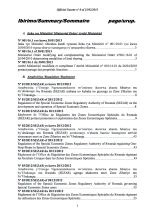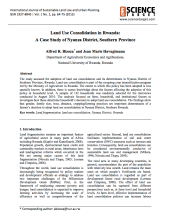Land Library Search
Through our robust search engine, you can search for any item of the over 73,000 highly curated resources in the Land Library.
If you would like to find an overview of what is possible, feel free to peruse the Search Guide.
/ library resources
Showing items 28 through 36 of 136.Ministerial Order N° 001/16.01 of 30/01/2013 Modifying and Complementing the Ministerial Order N° 001/16.01 of 26/04/2011 Determining Modalities of Land Sharing.
Published on the 25 February 2013.
In the complex soilscape of Rwanda, failure to tailor soil fertility management technologies to specific soil types is the major constraint to their adoption.
The study assessed the adoption of land use consolidation and its determinants in Nyanza District of Southern Province, Rwanda. Land use consolidation is part of the on-going crop intensification program led by the Ministry of Agriculture in Rwanda.
As Parliamentary gender quotas have become increasingly popular, so too
has the debate surrounding their effectiveness in enhancing women’s
representation and gender equality in governments around the world. Women offer
Large-scale land acquisitions by investors, which are often called ‘land grabs’ (see next section for de nition), can deprive rural women and communities of their livelihoods and land, increasing their food insecurity.
After remarkable social and economic reconstruction since 1994, Rwanda aspires to become a middle income country by 2020 with a strong focus on inclusive growth. In this context the Government of Rwanda (GoR) has recognized the critical nature of land policy and agricultural growth.
This brief discusses a pilot intervention in Rwanda led by the Belgian
NGO, RCN Justice & Démocratie, with support from the International
Development Law Organization (IDLO) and the Belgian Government. A
more detailed and complete discussion of the pilot is given in Lankhorst
Food crop production in Rwanda is predominantly dependent on the productivity in small- and fragmented farms. Raising productivity levels in smallholder farms therefore represents a vital means to economic growth and poverty reduction in Rwanda.
Since 2004, Rwanda has embarked on an ambitious land tenure reform programme (LTR) aimed
at increasing security of tenure to all land owners and the elimination of all forms of
discrimination. This has largely been achieved through the establishment and implementation of








